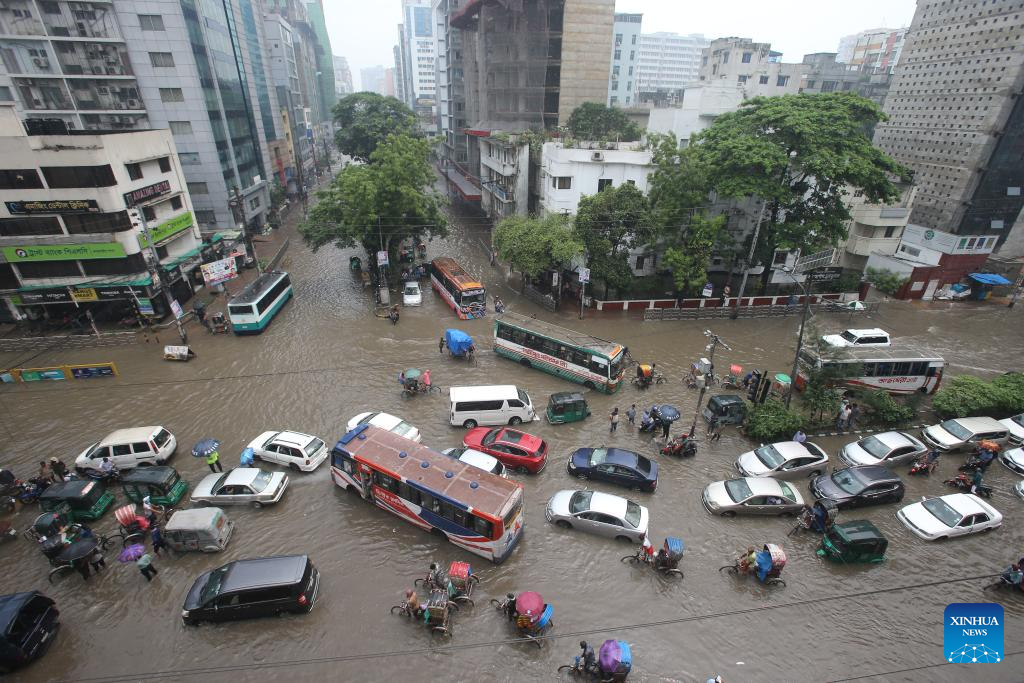
[ by Bahauddin Foizee ]
Dhaka city experiences flooding and waterlogging almost every year, posing a serious threat not only to daily life but also to the nation’s economy and social stability. With the onset of the monsoon, large parts of the capital become submerged, severely disrupting mobility and everyday activities.
Multiple factors contribute to this recurring crisis, including unplanned urbanization, weak infrastructure, environmental degradation and administrative inefficiency. Despite numerous projects and plans over the years, no significant progress has been made in alleviating waterlogging. It is high time to develop a sustainable and practical solution framework for Dhaka.
Due to Dhaka’s geographical location in a low-lying area, rainwater remains stagnant during monsoons. However, the problems are not only natural but also man-made. The city’s canals and rivers are shrinking because of illegal encroachment and pollution. Reservoirs are being filled, construction is carried out haphazardly and poor waste management disrupts natural water flow. During the monsoon, canals and drains clogged with plastic and solid waste prevent rainwater from draining properly, leading to widespread flooding across the city.
Unregulated and haphazard urban development is another major contributor. The ever-increasing population pressure, resulting from mass migration to the capital city every year, has led to the growth of illegal and unsafe settlements around the city, often lacking essential infrastructure. Narrow roads, filled-up canals and inadequate drainage systems cause severe waterlogging in these areas. Urban planning often neglects the need to preserve water bodies and reservoirs, while ongoing construction further worsens the problem.
Although both national and city governments have initiated various projects over the years to address waterlogging, many of these have failed before implementation. A lack of proper planning and monitoring undermines the effectiveness of these projects. Frequently, projects are left incomplete or unauthorized work is carried out, leading to inadequate or ineffective outcomes. Moreover, poor coordination among different government and local agencies remains a major obstacle to implementation.
City residents, alongside the government, also have a vital role to play. Public awareness must be raised about proper waste disposal, environmental preservation and protection of canals and drains. There must be strict oversight and law enforcement to prevent plastic and other waste from being dumped into water channels. In addition, the use of digital platforms to address citizen complaints can quickly and significantly improve administrative efficiency and promote transparency.
The negative effects of climate change are now clearly visible in Bangladesh’s urban areas. In densely populated cities like Dhaka, sudden heavy rainfall and unexpected flooding place immense pressure on already fragile infrastructure. Therefore, it is crucial to incorporate climate adaptation strategies into urban planning. It is imperative to prioritize the development of infrastructure that is sustainable, environment-friendly and suited to modern urban needs. The drainage system needs to be modernized, and the preservation of water bodies, reservoirs and parks must become part of all urban development goals.
Waterlogging also increases public health risks. Diseases like diarrhea, tetanus and mosquito-borne illnesses become more prevalent during the monsoon, posing severe threats to children, the elderly and the ill. Maintaining sanitation, cleanliness and hygiene, especially during the rainy season, is critical.
To solve Dhaka’s flooding and waterlogging problems, infrastructure improvements must go hand-in-hand with administrative efficiency and public awareness. Strict actions must be taken against illegal encroachments, and localized and ward-level planning should be used to address specific problems. An inter-agency coordination committee is essential to eliminate institutional conflicts and improve efficiency.
In conclusion, if Dhaka’s flooding and waterlogging issues are not permanently resolved, the city will face greater economic losses, health hazards and social unrest. Education, healthcare, transportation and business will all be adversely affected. What is needed now is a well-thought-out, eco-friendly and sustainable urban development policy, one that combines modern technology, effective administration and an aware and active citizenry. Only through this united effort can Dhaka be transformed into a safe and livable city, which is crucial for the country’s overall development.
